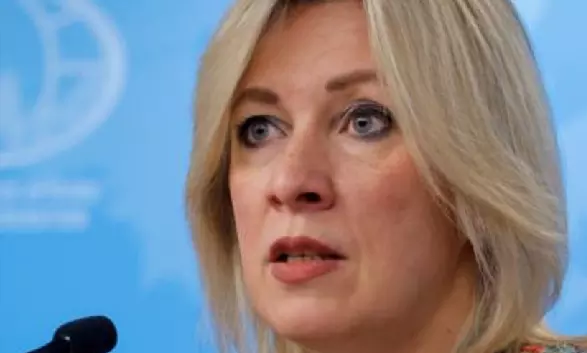Live
- SRKR College bags IEI Engg Excellence Award
- Rozgar Mela a favourite programme of PM Modi: Bandi Sanjay
- Multi-stakeholder efforts needed to improve school facilities
- Be part of transforming India into Viksit Bharat: Kishan Reddy
- Now, tackle pest menace in hostels with LED lights
- Hyderabad: Students protest over appointing Physics prof as EdCET convener
- Young doctors urged to work for healthy community
- Bhavani Deeksha Viramana continues
- Sridhar Babu hardsells key sectors to Malayasia
- Health Min Damodar Raja Narsimha holds meet to improve infra in govt hosps
Just In
Russian Spokesperson Instructed to Stay Silent on ICBM Strike During Press Conference: Viral Video


A viral video shows Russian spokesperson Maria Zakharova being instructed to stay silent on Russia’s ICBM strike in Ukraine, raising concerns over Kremlin control.
Maria Zakharova, a spokesman for the Russian Foreign Ministry, was caught answering a phone at a news conference, and the video went viral. The video claims that she was instructed by superiors to keep quiet about Russia's intercontinental ballistic missile (ICBM) launch during an assault on Ukraine.
In the footage, which has become popular on social media, Zakharova is seen interrupting the conversation and being expressly instructed not to discuss the missile strike. Zakharova claims that the speaker on the other end of the conversation said, "Masha, don't comment at all on the ballistic missile strike on Yuzhmash, as the Westerners started talking about it."
The world was made aware of the Russia-Ukraine war on Thursday as Moscow launched a powerful RS-26 missile during a military strike. The RS-26 is an intercontinental ballistic missile (ICBM) that can deliver a nuclear warhead weighing 800 kg and has a maximum range of 5,800 km. This is the first documented use of such a potent weapon during the ongoing Russian war on Ukraine.
Using weapons supplied by the United States and the United Kingdom, Ukraine had launched its missile attacks against critical infrastructure deep within Russian territory a few days prior. Russian soldiers also fired a Kinzhal hypersonic missile and seven Kh-101 cruise missiles in addition to the RS-26 ICBM. The Ukrainian Air Force reported that six of these Kh-101 missiles were successfully intercepted.
The timing of this ICBM launch has caused international concern due to the missile's nuclear capability and its involvement in Russia's continuing military campaign in Ukraine. Zakharova's call during the press conference has only fuelled conjecture about the Kremlin's attempts to control the narrative surrounding these high-stakes military activities, and Russian authorities have not revealed the specifics of the missile strike.
The RS-26 missile is the most powerful weapon in the Russian arsenal.
Russia's strategic missile assets, including the RS-26 ICBM, are primarily used for long-range nuclear strikes. The missile has a 5,800-kilometer range and can carry an 800-pound nuclear warhead, making it a potent instrument for Moscow's military strategists. Utilizing it in the conflict with Ukraine is a significant advancement, suggesting that the Russian onslaught on Ukraine is intensifying as some of its most advanced weaponry is being employed.
In an attempt to determine the details of the missile attacks and their possible impact on the broader geopolitical landscape, experts have been closely monitoring the situation. Ukrainian President Volodymyr Zelenskyy has condemned the strike, and Western leaders have expressed concern about Russia's increasing reliance on nuclear-capable missiles.
The tension between Russia and the West is rising.
The rise in missile strikes is merely the latest phase in the Russia-Ukraine war, which has gained support from Western nations. Ukrainian forces have been able to attack Russian military positions on their land thanks to advanced missile technology and military support from the West.
Given that both nations are now utilizing weapons capable of wreaking havoc, the missile attacks from both sides—Russia's RS-26 launch and Ukraine's retaliatory missile strikes—highlight how dangerous the situation is getting. As tensions rise, observers from around the world remain on edge, concerned that a further escalation might have even more disastrous consequences.
Following Zakharova's phone call and the directives she received, Russia's operations in Ukraine have become much more interesting. The episode has sparked new questions about the extent of control over public statements and Kremlin messaging on the war, even if the Russian spokesperson has declined to offer a comprehensive reaction to the missile strike.
The widely circulated video of Zakharova's call has raised more speculation about the extent to which Russian authorities are attempting to suppress information about their military operations. The world continues to keep a careful eye on Ukraine's predicament, waiting to see Russia's next move and the potential consequences of a long-running conflict that doesn't seem to be ending.
In conclusion,
The widely circulated video showing Russian spokesperson Maria Zakharova being urged to keep quiet about a ballistic missile attack amid the current conflict in Ukraine has raised serious worries about Russia's internal communications and narrative control. The whole community is closely watching the developments of this crucial geopolitical issue as the Russia-Ukraine war has intensified dramatically since the RS-26 missile was launched.
- Maria Zakharova phone call viral
- Russia ICBM strike Ukraine
- RS-26 missile launch Russia
- Russia Ukraine missile escalation
- Zakharova instructed to stay silent
- Russian missile narrative control
- Ballistic missile RS-26 attack
- Russia-Ukraine war escalation
- Maria Zakharova viral news conference
- ICBM strike on Yuzhmash

© 2024 Hyderabad Media House Limited/The Hans India. All rights reserved. Powered by hocalwire.com






